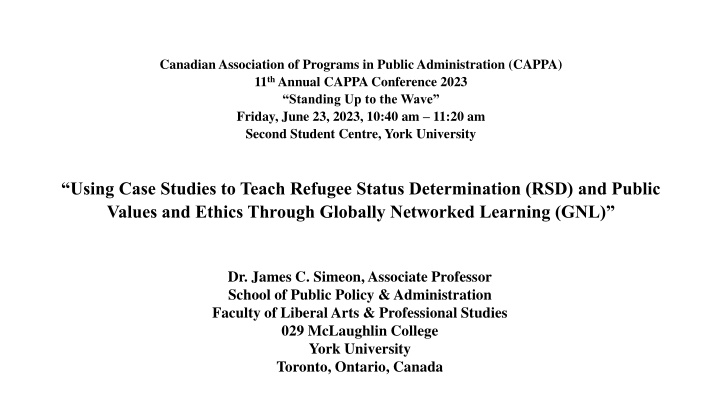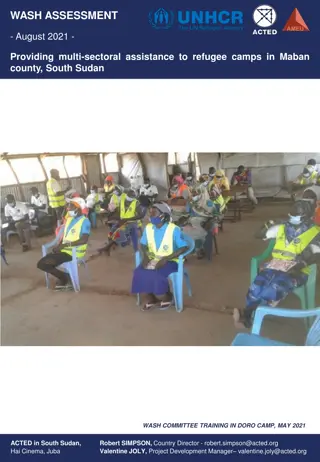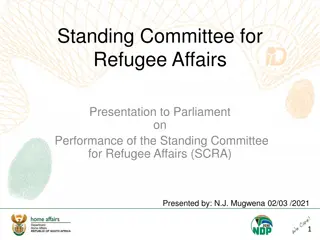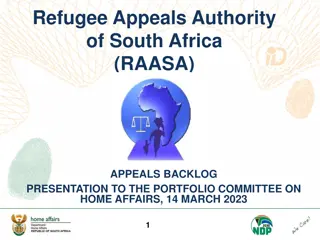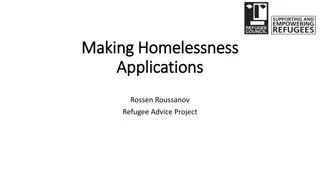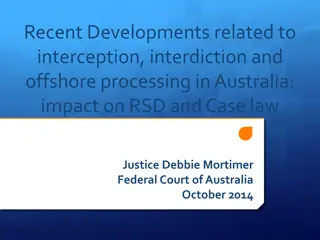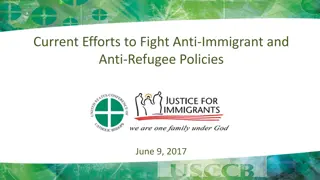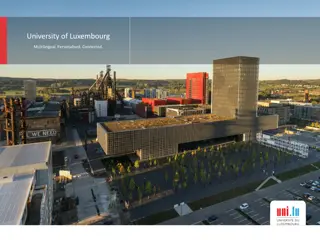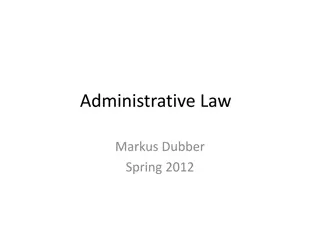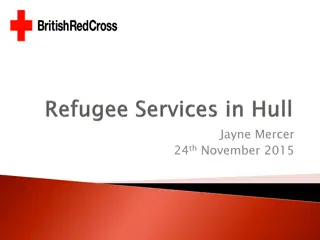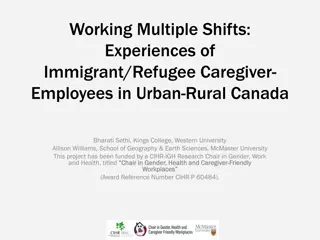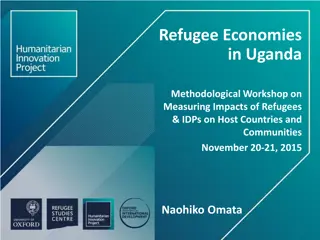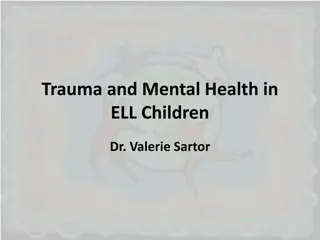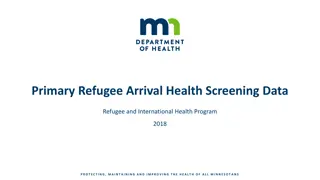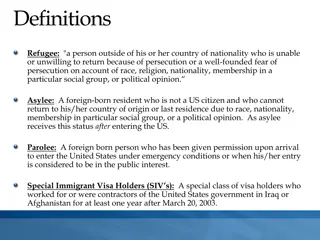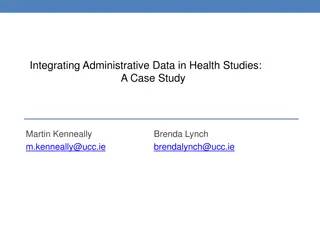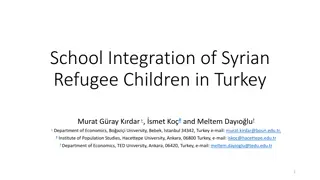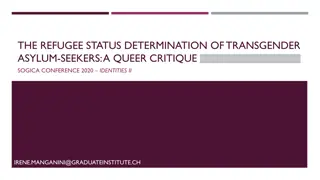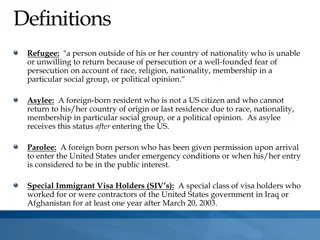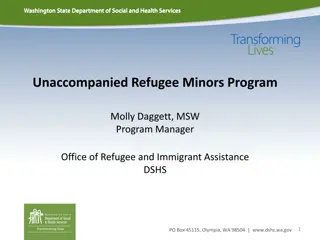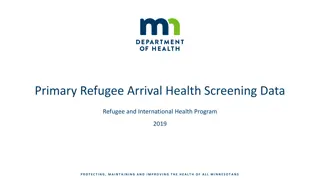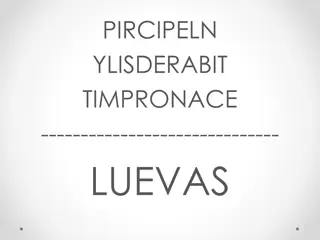Using Case Studies to Teach Refugee Status Determination and Public Values
Global Learning has permeated Higher Education. Explore how GNL facilitates teaching RSD and ethics through case studies in a globally interconnected setting.
Download Presentation

Please find below an Image/Link to download the presentation.
The content on the website is provided AS IS for your information and personal use only. It may not be sold, licensed, or shared on other websites without obtaining consent from the author.If you encounter any issues during the download, it is possible that the publisher has removed the file from their server.
You are allowed to download the files provided on this website for personal or commercial use, subject to the condition that they are used lawfully. All files are the property of their respective owners.
The content on the website is provided AS IS for your information and personal use only. It may not be sold, licensed, or shared on other websites without obtaining consent from the author.
E N D
Presentation Transcript
Canadian Association of Programs in Public Administration (CAPPA) 11thAnnual CAPPA Conference 2023 Standing Up to the Wave Friday, June 23, 2023, 10:40 am 11:20 am Second Student Centre, York University Using Case Studies to Teach Refugee Status Determination (RSD) and Public Values and Ethics Through Globally Networked Learning (GNL) Dr. James C. Simeon, Associate Professor School of Public Policy & Administration Faculty of Liberal Arts & Professional Studies 029 McLaughlin College York University Toronto, Ontario, Canada
Using Case Studies to Teach Refugee Status Determination (RSD) and Public Values and Ethics Through Globally Networked Learning (GNL) PRESENTATION OUTLINE 1. Global Learning has permeated tertiary education. It provides a learning experience like no other and students thoroughly enjoy it. 2. Forced Displacement One of the global issues of our time. It is at record levels, and it continues to rise. The rate has doubled over the last decade. It is one of the pre-eminent global concerns today. 3. Globally Networked Learning (GNL) or Globally Shared Learning (GSL) or Collaborative Online International Learning (COIL) is when instructors and students come together from different countries online to learn from each other. (See https://collab-edu.com/hub/coil/p/whatiscoil.) 4. The collaborators, a brief outline of the structure of our GNL common sessions, and the type of (Refugee Status Determination) case study assignments we have used to date, and, in the process, how public ethics and values are taught. 5. Some Concluding Reflections
Using Case Studies to Teach Refugee Status Determination (RSD) and Public Values and Ethics Through Globally Networked Learning (GNL) Global Learning has permeated Higher Education Global Learning has been defined as the critical analysis of and engagement with complex, interdependent global systems and legacies (such as natural, physical, social, cultural, economic, and political) and their implications for people s lives and the earth s sustainability. ( Global Learning, Center for Teaching Innovation, undated, Cornell University, https://teaching.cornell.edu/teaching-resources/building- inclusive-classrooms/global-learning#:~:text=Global%20learning%20is%20a%20critical,lives%20and%20the%20earth's%20sustainability,) I believe that global learning will likely be the way that many of the online and hybrid courses will be taught at universities in the near future. Especially, those courses that have an international, global, or comparative dimension to them. The advent of new digital communications technologies has made it cost effective to be able to deliver online courses. Virtually, all students, at least in the Global North, have access to a mobile phone, or tablet, or lap top computer with easy access to the internet. Instructors are becoming more proficient at delivering their courses online or in a hybrid format. Further, the ability to be able to work with people from different countries is going to become essential in the future for faculty and students alike. Inter-cultural skills and abilities, including communications, will become vital in the future as employers look for people who have developed and refined these types of skill sets.
Using Case Studies to Teach Refugee Status Determination (RSD) and Public Values and Ethics Through Globally Networked Learning (GNL) Forced Displacement is one of the major global issues of our time. The United Nations High Commissioner for Refugees (UNHCR), in its Global Appeal 2023, has indicated that it will have to provide for a record number of forcibly displaced and stateless people that will total some 117.2 million people. It will require $10.211 billion for its programs across 134 countries and territories. (UNHCR, Global Focus, GlobalAppeal 2023, https://reporting.unhcr.org/globalappeal.) This does not include the Palestinian refugees who are the responsibility of the United Nations Relief and Works Agency for Palestinian Refugees in the Near East (UNRWA). There are some 5.9 million Palestinian refugees that are situated in 58 camps that are located in Jordan (10), Lebanon (12), Syria (9), West Bank (19), and Gaza Strip (8). Jordan is hosting 2.4 million people, Gaza Strip 1.6 million, West Bank 901 K, Syria 580 K, and Lebanon 487 K. (UNRWAinAction, https://www.unrwa.org/sites/default/files/2023_unrwa_in_action.pdf.) The number of forcibly displaced and stateless persons has doubled over the last decade and has continued to escalate. The numbers have increased dramatically since the Russia-Ukraine War with the total number of Ukrainians who have been forcibly displaced reaching 17.6 million. By comparison the internationalized internal armed conflict in Syria that has been ongoing since 2011 is 12 million people. (UNHCR, Global Focus, Ukraine, https://reporting.unhcr.org/operational/operations/ukraine#:~:text=At%20the%20end%20of%20October,of%20them%20women%20and%20children.) (UNHCR, Global Focus, Syria Situation https://reporting.unhcr.org/operational/situations/syria-situation#:~:text=Over%2012%20million%20syrians%20remained,from%205.7%20million%20in%202021.)
Using Case Studies to Teach Refugee Status Determination (RSD) and Public Values and Ethics Through Globally Networked Learning (GNL) Globally Networked Learning (GNL) Online Learning in the Global Classroom Globally Networked Learning (GNL) refers to an approach to research, learning, and teaching that enables students, faculty, and non-academic researchers from different locations around the world to participate in, and collaborate on, knowledge- making processes and concrete research projects. (York University, York International, Get Involved in Globally Networked Learning, https://yorkinternational.yorku.ca/gnl/.) With the assistance of York University s York International GNL Unit I have been collaborating with a number of colleagues at a number of different universities to deliver common instructional modules in my courses on the International Refugee Protection Regime I: Critical Issues and International Refugee Protection Regime II: Research Seminar. I have worked closest with the Tecnologico de Monterrey in Mexico. I have also worked with the Universidad San Francisco de Quito in Ecuador and Northwestern University in the United States. We have had seven iterations of the GNL common sessions over the last three years in a number of different modalities. The common sessions are held over the course of a semester and typically follow a particular structure. We use a common designated course website for our GNL collaborations that students from all the universities can access. The common sessions proceed with dividing all our students into international mixed teams of students from each of the universities. The students then move through various steps in the common session, both pedagogically, and practically: Familiarization - Ice Breaker Student international team members meet each other asynchronously online for the first time. Interaction - Conference A lecture on the topic under examination. Students meet synchronously in their respective teams. Monitoring -Assignments (1) Padlet Exercise, and (2) Case Study Analysis and production of a team video on the case study. - Video Presentations (1) Students select the top videos in various categories, and (2) Presentation of the winning videos and an examination and discussion of each of them. Reflexion - Reflection Why do the student selected videos seem to work so well? Deconstruct/critique the winning videos. -- Students provide feedback on the course, formal and informal, oral and online. Self and peer evaluation is encouraged.
Using Case Studies to Teach Refugee Status Determination (RSD) and Public Values and Ethics Through Globally Networked Learning (GNL) Refugee Status Determination Case Studies and Peer Assessment We have relied on case studies that are based on claims for refugee protection. The students are given a fact scenario in the case study, and they have to analyze the case to determine whether the person ought to be determined to be a Convention refugee or a person in need of protection. The case studies have covered some difficult and complex issues in refugee status adjudication. For example, -- Refugee claims based on gender-based persecution (Spousal Abuse) -- Refugee claims based on sexual orientation (Applicant is from the LBGTQ2S+ Community) -- Refugee claims based on a fear of forced recruitment into a notorious street gang (MS-13 Street Gang) The case studies are fairly brief no more than one page - with a series of questions that the student teams are challenged to answer. The students are given supporting materials that they must consider when analyzing the case and deciding it, and then putting this all together in their group video assignment. As noted, the students are also given a lecture on refugee status adjudication and how to analyze and decide claims for refugee protection. After submitting their videos, the students view each other s videos and select those videos that have: (1) the best-case study analysis and resolution; (2) the most creative video; (3) the video with highest production value; (4) the most impactful video. We make the assignments interactive and competitive so that the international mixed teams are trying to do their best to be able to stand out and to be selected by their peers for preparing one of the best videos in each one of these four categories. At the last class, we also present our instructors comments on the winning videos in terms of their strengthens and areas that might require further work and attention.
Using Case Studies to Teach Refugee Status Determination (RSD) and Public Values and Ethics Through Globally Networked Learning (GNL) Refugee Status Determination (RSD) in Canada Refugee status determination is conducted by the largest administrative tribunal in Canada, the Immigration and Refugee Board (IRB). It is a quasi-judicial tribunal and although it is overseen by the Minister of Immigration, Refugees, and Citizenship Canada (IRCC), the Minister and government cannot interfere in its decision-making. It is entirely independent in this regard. Its judgements can be appealed to the Federal Court of Canada, then the Federal Court of Appeal, and, eventually, the Supreme Court of Canada. How do these case studies on refugee status determination teach public service values and ethics? Government of Canada, Values and Ethics Code for the Public Sector Federal public servants have a fundamental role to play in serving Canadians, their communities and the public interest under the direction of the elected government and in accordance with the law. Statement of Values include: Respect for Democracy Respect for People Integrity - Integrity is the cornerstone of good governance and democracy. By upholding the highest ethical standards, public servants conserve and enhance public confidence in the honesty, fairness and impartiality of the federal public sector. Stewardship Excellence (Government of Canada, Values and Ethics Code for the Public Sector, https://www.tbs-sct.canada.ca/pol/doc-eng.aspx?id=25049.)
Using Case Studies to Teach Refugee Status Determination (RSD) and Public Values and Ethics Through Globally Networked Learning (GNL) Deciding Claims for Refugee Protection To decide claims for Convention refugee status, you must respect those who appear before the IRB. You have to decide claims based on the facts of the case and in accordance with the law. For refugee status adjudication, you must know the prevailing law, both the Immigration and Refugee Protection Act (IRPA) and the relevant jurisprudence. The onus is on the refugee claimant to make out their claim for refugee protection. The claimant must satisfy the Board that they are who they claim to be. They must establish their identity. The IRB must be satisfied that the applicant has presented credible and trustworthy evidence in support of their claim for refugee status. The claimant must establish that they would have a well-founded fear of persecution should they return to their country of nationality or country of former habitual residence, for those who are stateless. The legal test for a well-founded fear of persecution in Canada is one that is based on the totality of evidence, before the decision maker at the hearing, and on a balance of probabilities, based on the credible and trustworthy evidence before them, there must be more than a mere possibility that there is a well-founded fear of persecution should the person go back to their country of nationality or former country of habitual residence. The legal test for refugee protection is forward looking and it must be based on the decision maker s assessment of the human rights conditions in their country of nationality today. This is based on current country conditions as found in the human rights reports on the country of alleged persecution of the claimant. One must also apply the appropriate guidelines that are issued by the Chairperson of the Immigration and Refugee Board of Canada as to gender related persecution or claims based on sexual orientation and so on. Chairperson s Guideline 4: Gender Considerations in Proceedings Before the Immigration and Refugee Board Chairperson s Guideline 8: Procedures with Respect to Vulnerable Persons who Appear Before the IRB Chairperson s Guideline 9: Proceedings Before the IRB Involving Sexual Orientation, Gender Identity and Expression, and Sex Characteristics
Using Case Studies to Teach Refugee Status Determination (RSD) and Public Values and Ethics Through Globally Networked Learning (GNL) Concluding Thoughts and Reflections GNL teaching collaborations will gain in popularity, especially, for courses that lend themselves to international or global issues and concerns. They provide highly valuable intercultural skill sets and abilities. Students are highly motivated to participate in our GNL sessions. They enjoy the social interaction and working with students in other countries. Their individual and collective learning experiences appear to be more memorable and enjoyable. Case studies provide students with the opportunity to apply what they acquired and learned about refugees, and other forced migrants, to a factual situation to decide whether they ought to be determined to be a Convention refugee or person in need of protection, according to Canadian law. They come to understand and to appreciate what it is like to decide whether someone ought to be a Convention refugee or person in need of protection. Dividing students into international mixed teams and having them compete for the best video in different categories adds interests and is an additional incentive. This also enhances the interactive learning experience for students. All refugee status adjudicators are independent decision makers, who must adhere to the highest ethical standards and public service values, as found in the Canadian Government s Values and Ethics Code for the Public Sector. The case study method is an effective way to involve students with the means to acquire and to develop administrative law decision-making skill sets that exemplify public values and ethics.
